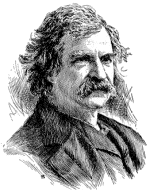The Boys’ Life of Mark Twain
by Paine

XXXIII. In England
Mark Twain closed his lecture season in February (1872), and during the same month his new book, “Roughing It,” came from the press. He disliked the lecture platform, and he felt that he could now abandon it. He had made up his loss in Buffalo and something besides. Furthermore, the advance sales on his book had been large.
“Roughing It,” in fact, proved a very successful book. Like “The Innocents Abroad,” it was the first of its kind, fresh in its humor and description, true in its picture of the frontier life he had known. In three months forty thousand copies had been sold, and now, after more than forty years, it is still a popular book. The life it describes is all gone-the scenes are changed. It is a record of a vanished time–a delightful history–as delightful to-day as ever.
Eighteen hundred and seventy-two was an eventful year for Mark Twain. In March his second child, a little girl whom they named Susy, was born, and three months later the boy, Langdon, died. He had never been really strong, and a heavy cold and diphtheria brought the end.
Clemens did little work that summer. He took his family to Saybrook, Connecticut, for the sea air, and near the end of August, when Mrs. Clemens had regained strength and courage, he sailed for England to gather material for a book on English life and customs. He felt very friendly toward the English, who had been highly appreciative of his writings, and he wished their better acquaintance. He gave out no word of the book idea, and it seems unlikely that any one in England ever suspected it. He was there three months, and beyond some notebook memoranda made during the early weeks of his stay he wrote not a line. He was too delighted with everything to write a book–a book of his kind. In letters home he declared the country to be as beautiful as fairyland. By all classes attentions were showered upon him–honors such as he had never received even in America. W. D. Howells writes:[8]
“In England rank, fashion, and culture rejoiced in him. Lord mayors,
lord chief justices, and magnates of many kinds were his hosts; he
was desired in country houses, and his bold genius captivated the
favor of periodicals, that spurned the rest of our nation.”
He could not make a book–a humorous book–out of these people and their country; he was too fond of them.
England fairly reveled in Mark Twain. At one of the great banquets, a roll of the distinguished guests was called, and the names properly applauded. Mark Twain, busily engaged in low conversation with his neighbor, applauded without listening, vigorously or mildly, as the others led. Finally a name was followed by a great burst of long and vehement clapping. This must be some very great person indeed, and Mark Twain, not to be outdone in his approval, stoutly kept his hands going when all others had finished.
“Whose name was that we were just applauding?” he asked of his neighbor.
“Mark Twain’s.”
But it was no matter; they took it all as one of his jokes. He was a wonder and a delight to them. Whatever he did or said was to them supremely amusing. When, on one occasion, a speaker humorously referred to his American habit of carrying a cotton umbrella, his reply that he did so “because it was the only kind of an umbrella that an Englishman wouldn’t steal,” was repeated all over England next day as one of the finest examples of wit since the days of Swift.
He returned to America at the end of November; promising to come back and lecture to them the following year.
[7] From “My Mark Twain,” by W. D. Howells.
 Continue...
Continue...![[Buy at Amazon]](../images.amazon.com/images/P/B0006AHKG6.01.MZZZZZZZ.gif)